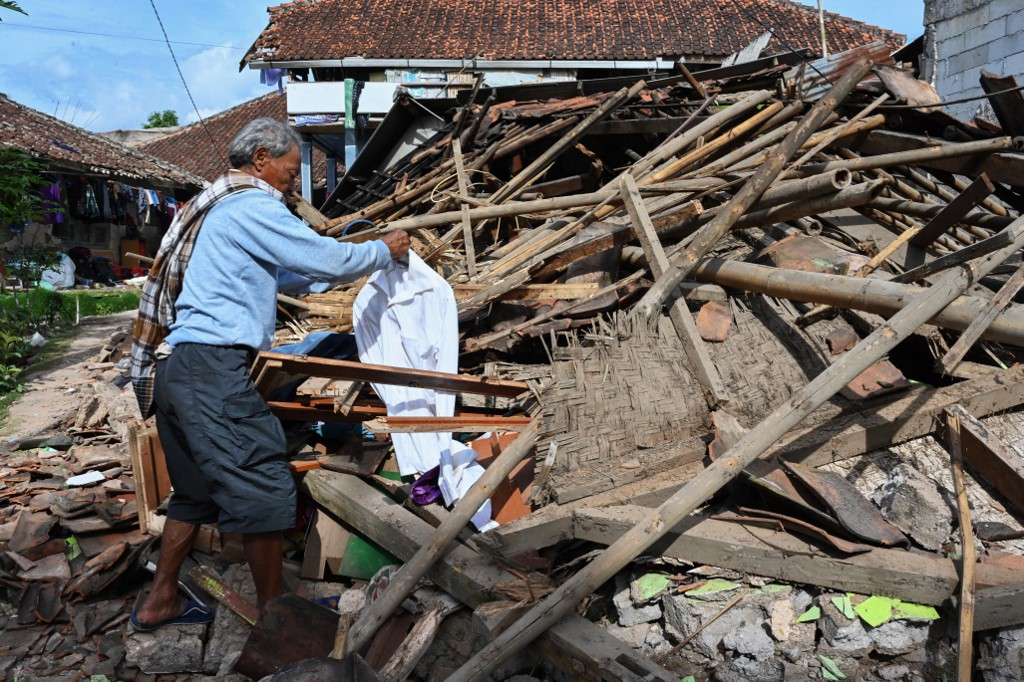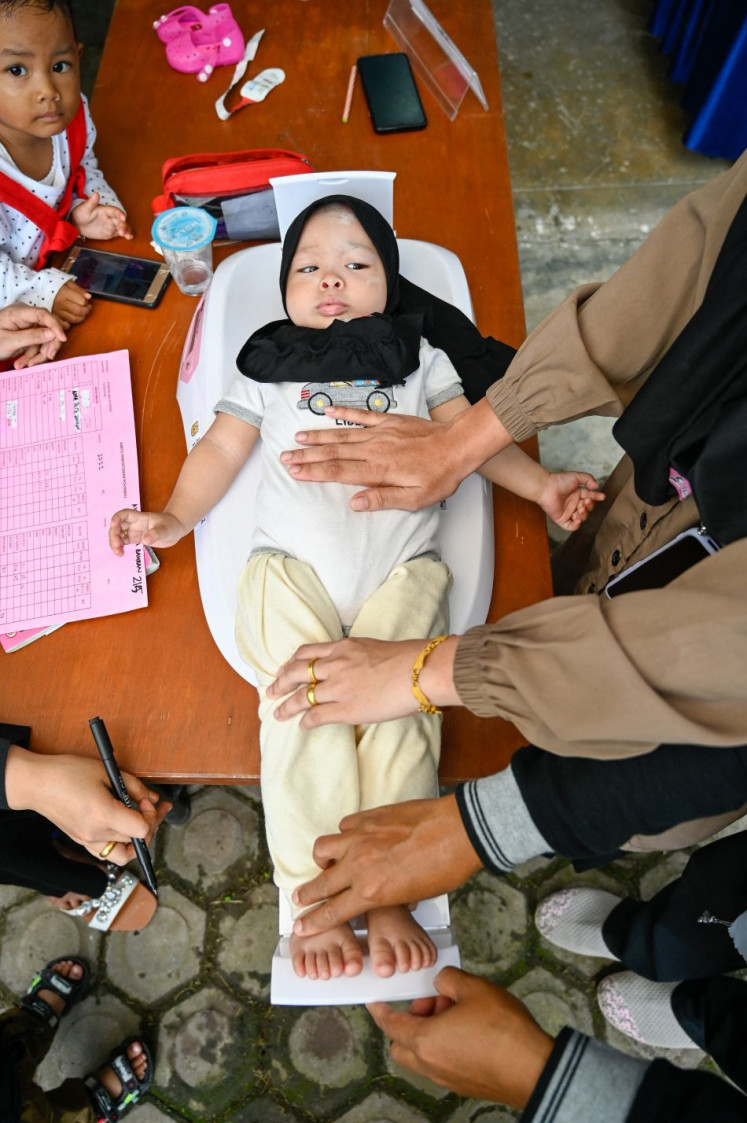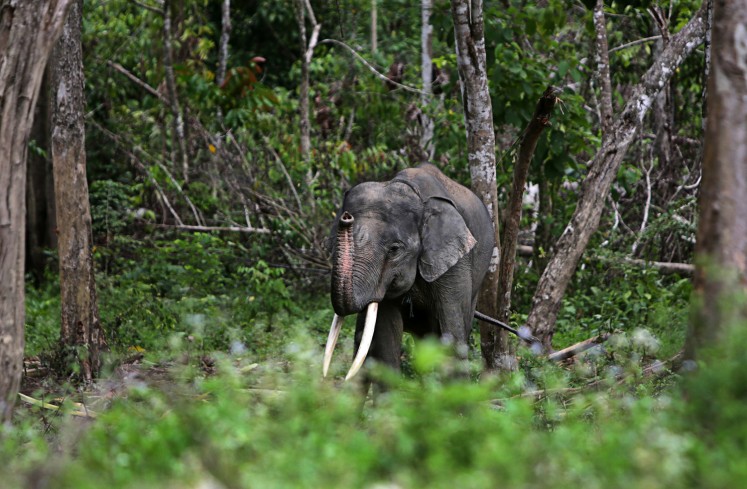Popular Reads
Top Results
Can't find what you're looking for?
View all search resultsPopular Reads
Top Results
Can't find what you're looking for?
View all search resultsProtecting small businesses: The case for closing the protection gap for natural disasters
The Indonesian Financial Services Authority (OJK) found that only 3 percent of the 64 million MSMEs in Indonesia have natural disaster insurance.
Change text size
Gift Premium Articles
to Anyone
Asia is a global hotspot for natural disasters. Last year, four of the five costliest natural disasters worldwide happened in Asia.
Overall, losses from natural catastrophes in Asia increased to US$70 billion in 2022. Natural disasters, such as earthquakes, typhoons, and floods, present a significant challenge to sustainable economic development in Asia.
Despite this, emerging economies in the Asia remain markedly underinsured by global standards. For example, last year’s second-costliest and greatest humanitarian disaster was severe flooding in Pakistan. Direct losses are estimated to be at least $15 billion – an enormous amount given the size of the country’s gross domestic product (GDP). Almost nothing was insured.
With climate change exacerbating the frequency and severity of natural disasters, the protection gap in Asia will further widen, leaving many more vulnerable to physical destruction and economic loss. This is particularly concerning for the micro-, small- and medium enterprises (MSMEs) that drive many economies in Asia.
MSMEs form the backbone of many economies in Asia. In Southeast Asia, more than 71 million MSMEs account for 97 percent of enterprises and more than 40 percent of GDP. Yet, despite their outsized role in the regional economy, most MSMEs in Southeast Asia are under-insured and financially vulnerable – only about 15 percent have some form of insurance coverage against natural disasters (see microinsurancenetwork.org).
Take Indonesia as an example, where MSMEs contribute more than 60 percent to the national GDP. A study by the Indonesian Financial Services Authority (OJK) found that only 3 percent of the 64 million MSMEs in Indonesia have natural disaster insurance, putting the protection gap for natural disasters at $1.4 billion when benchmarked against developed insurance markets.
Persistent low levels of insurance among MSMEs pose a challenge to the region’s sustainable economic development, especially given the high exposure to floods, typhoons and earthquakes that cause substantial damage to property, loss of inventory, supply chain disruptions and loss of lives.
MSMEs that lack adequate protection may struggle to recover from unforeseen losses if they do not have the financial means to rebuild or restart their businesses. Financial institutions may also be reluctant to lend to MSMEs that are underinsured or affected by natural disasters, according to the World Bank. This can lead to a vicious cycle where MSMEs are unable to invest in business growth or risk reduction measures, which in turn hinders their long term economic development.
There are several reasons why MSMEs do not have sufficient insurance coverage. Small business owners are often not fully aware of the value that insurance can bring, or the types of insurance products that are available. Many also underestimate the potential risks associated with natural disasters, resulting in them deprioritizing insurance altogether.
Another reason is the lack of suitable and affordable insurance products available to MSMEs. Low-ticket insurance is costly to develop, distribute and administer. It is often challenging to access and verify MSME clients especially in rural areas, and the relatively high operational costs often inhibit the design of effective, scalable insurance solutions. As a result, most MSMEs are left with traditional insurance options that may be unsuitable, expensive or inaccessible.
More can be done to bolster MSMEs' resilience against natural disasters, which in turn will support the financial inclusion and sustainable economic development of MSMEs.
Improving awareness of the importance and benefits of insurance in the MSME community will bring about the most direct impact of encouraging the uptake of insurance.
Partnerships within the MSME ecosystem can also enable a better understanding and therefore the development of insurance options that are suitable, affordable, and accessible for MSMEs. This can be done through embedded insurance that can lower the average cost of insurance, and help MSMEs experience first-hand the benefits of insurance.
The use of parametric insurance can expedite and make the claims process more efficient, ensuring that MSMEs receive faster pay-outs after a natural disaster.
Suitable products addressing the challenges and needs of MSMEs are gradually being developed. For instance, Munich Re partnered with digital lenders and supply chain platforms in Southeast Asia to offer wholesale insurance protection.
This protection covers both MSMEs and the ecosystem against accidental death, natural catastrophe, and specific credit default scenarios. Another example is related to the Cianjur, West Java earthquake in November 2022, which killed hundreds of people and affected numerous households and businesses.
While few MSMEs in Cianjur would have purchased insurance to protect their properties and businesses, our solutions provided MSMEs with financial relief depending on the estimated earthquake impact at their registered locations, to support them to rebuild their businesses after the natural disaster. So far over 3,000 MSMEs across Indonesia are being supported by these solutions.
By providing access to affordable and suitable insurance coverage, insurers can help MSMEs withstand adversity, safeguard their assets and ensure the long-term sustainability of their businesses. Improving insurance penetration for small businesses in way leads to a brighter, and more resilient future, for Southeast Asia.
***
The writer is chief executive for Asia Pacific – Australasia, Japan, Korea, South-East Asia – at Munich RE.











